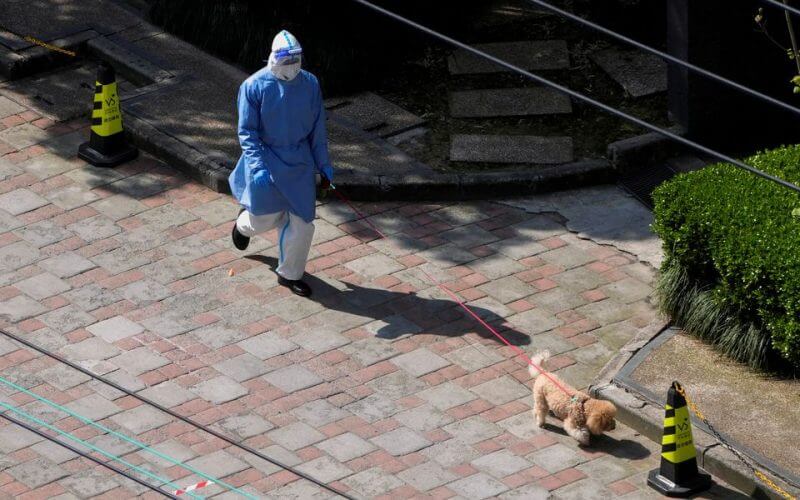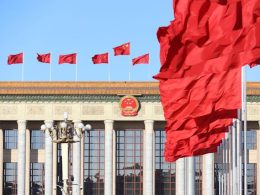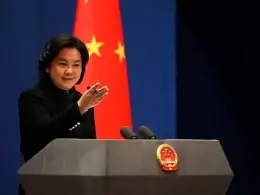Shanghai will remain under lockdown as it reviews results of an exercise to test all of its 26 million residents for COVID-19, authorities said on Monday.
The city began its two-stage lockdown on March 28, initially in Shanghai's eastern districts, and later expanded to cover the whole city.
The curbs, which have massively disrupted daily life and business operations in China's financial hub, were initially scheduled to end at 5 a.m. local time (9 p.m. GMT) on Tuesday.
"The city will continue to implement seal and control management and strictly implement 'staying at home', except for medical treatment," the city government said on its official WeChat account.
It did not give an indication of when the curbs might lift.
The country sent the military and thousands of healthcare workers into Shanghai to help carry out COVID-19 tests for all of its 26 million residents on Monday, in one of the country's biggest-ever public health responses.
Some residents woke up before dawn to stand in queues for white-suited healthcare workers to swab their throats as part of nucleic acid testing at their housing compounds.
The People's Liberation Army (PLA) on Sunday dispatched more than 2,000 medical personnel from across the army, navy and joint logistics support forces to Shanghai, an armed forces newspaper reported.
About 38,000 healthcare workers from provinces such as Jiangsu, Zhejiang and the capital Beijing have been dispatched to Shanghai, according to state media, which showed them arriving, suitcase-laden and masked up, by high-speed rail and aircraft.
It is China's largest public health response since it tackled the initial COVID-19 outbreak in Wuhan, where the novel coronavirus was first discovered in late 2019. The State Council said the PLA dispatched more than 4,000 medical personnel to the province of Hubei, where Wuhan is, at that time.
Shanghai, which began a two-stage lockdown on March 28 that has been expanded to confine practically all residents to their homes, reported 8,581 asymptomatic COVID-19 cases and 425 symptomatic COVID cases for April 3. It also asked residents to self-test on Sunday.
The city has emerged as a test of China's COVID elimination strategy based on testing, tracing and quarantining all positive cases and their close contacts.
The country has 12,400 institutions capable of processing tests from as many as 900 million people a day, a senior Chinese health official was reported as saying last month.
China's primarily uses pool testing, a process in which up to 20 swab samples are mixed together for more rapid processing.
The city has also converted multiple hospitals, gymnasiums, apartment blocks and other venues into central quarantine sites, including the Shanghai New International Expo Center which can hold 15,000 patients at full capacity.
Individuals who refuse to be tested for COVID for no justifiable reason will face administrative or criminal punishment, Shanghai police said on Saturday.
PUBLIC FRUSTRATION
The surge in state support for Shanghai comes as the city is straining under the demands of the country's "dynamic clearance" strategy, with some residents complaining of crowded and unsanitary central quarantine centres, as well as difficulties in securing food and medical help.
Some have begun to question the policies, asking why COVID-positive children are separated from their parents. Western diplomats have also urged China not to do so. read more
On Monday Shanghai official Wu Qianyu told a news conference that children could be accompanied by their parents if the parents were also infected, but separated if they were not, adding that policies were still being refined.
There has also been increasing public questioning why mild or asymptomatic infections - the majority of Shanghai's cases - cannot isolate at home. read more
A Shanghai resident, who declined to be named for privacy reasons, told Reuters he had been transported to a central quarantine facility on Sunday night after reporting a positive result on a self test more than a week ago.
Another antigen test on Saturday showed he was no longer infected, but authorities insisted on sending him to quarantine, where he has been put in a flat where he has to share a toilet with two other patients, both of whom are still testing positive.
"How is this isolation?" he said, adding that he was now afraid of being re-infected. "I'm not in any mood to do anything right now, I can't sleep."
On Monday, videos circulating on the WeChat messaging app showed scores of people rushing to grab bedding and supplies from the dirty floor of what the poster said was a quarantine centre whose premises were still littered with construction materials.









